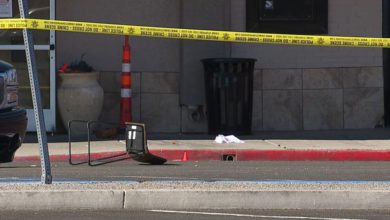
PHOENIX — The Veterans Memorial Coliseum in Phoenix has had its share of big acts over the years. Elvis performed there in the '70s. Nirvana played there during its In Utero tour. And Hulk Hogan scrapped with King Kong Bundy during a taping of Saturday Night's Main Event.
But none may compare to what will unfold over the next month, starting Thursday, when Maricopa County officials start delivery of nearly 2.1 million ballots their voters cast in the last presidential election.
The ballots that for months were at the center of a political dispute will be in the custody of the Arizona Senate for an unprecedented recount. The county began delivery of election equipment the Senate had demanded on Wednesday.
The effort begins as significant questions about security and the opportunities for observers and reporters to watch the process, among others things, remain unanswered.
More:Arizona Senate's plan for counting 2.1M ballots impossible and biased, election consultants say
The Senate’s plans for managing and funding the audit have raised concerns, too.
While the Senate commissioned the audit, it gave a private company the responsibility of seeing it through, limiting the public information available about who is involved, who is paying for it and how it will happen.
The Senate passed up a pitch from a firm specializing in elections and instead hired four different companies to run the audit for a $150,000 contract.
Prominent supporters of former President Donald Trump, such as former Trump administration official Christina Bobb, are also raising private donations they say will help cover the costs of the audit.
Meanwhile, the head of the firm tapped to lead the audit, Florida company Cyber Ninjas, appears to have promoted various conspiracy theories about the election on social media.
On Cyber Ninjas:Founder of company hired to conduct Maricopa County election audit promoted election fraud theories
The move is the biggest step so far in Republican legislators’ efforts to conduct their own audit of the county’s election results after Trump’s defeat last year,despite multiple county audits showing that votes were counted correctly.
Republican lawmakers argue the process is merely meant to address concerns they say their constituents have raised – and which many of the lawmakers have themselves promoted – about the last election.

But Arizona's top election official called it a circus.
"It is going to do nothing to restore anyone’s confidence in our election system and no one should take it seriously,” Secretary of State Katie Hobbs told reporters Wednesday.
The state Democratic Party has refused to participate, saying it does not wish to lend legitimacy to the process.
And several nonpartisan election consultants from across the country say the plan is inherently biased and lacking transparency.
They worry that the results will be inaccurate and will further erode the public’s confidence in the U.S. election system — even though they say this past general election was one of the most secure and transparent elections in the country’s history.

Meanwhile, the effort has attracted a host of former Trump aides and supporters who see this as just the start of a process they have waited for since his defeat in November.
"We’re at the top of the first inning of this. The lawsuits are going to come. This is where the grind really starts," former Trump adviser Steve Bannon said on his podcast Wednesday.
Whatever happens, the Senate is on its own. The county, which normally takes great care to ensure proper custody and security of the ballots, has absolved itself of all liability and county officials trained in election audits and security will not provide advice and guidance as the contractors take on the work.
The audit includes a full hand count of the 2.1 million ballots cast in the November 2020 general election, along with an analysis of voter information and an audit of the county’s voting technology. It is set to start this week and culminate with a report to be issued in about 60 days.
Related reading:Head of firm hired for Arizona election audit pushed fraud theories
Who will provide security? Who can watch?
Maricopa County agreed to drop off the ballots and voting machines under certain terms outlined in a letter a county attorney sent a Senate attorney Monday.
For one, the county made the Senate sign an indemnification agreement. This means the county is not liable for any loss or damages.

The county’s Elections Department said it followed careful procedures to ensure that the voting machines and ballots are safe during transport — at least while they had custody of them. Maricopa County Sheriff’s Office deputies were present as the county delivered the ballots, and the county used specialized racks to transport the voting machines.
While the Senate assumed liability for the ballots, the Sheriff's Officesaid the Senate had asked it to provide deputies for round-the-clock security at the coliseum.
A spokesman said Sheriff Paul Penzone received an email from Fann on Tuesday requesting six deputies on-site through May 14, when the Senate’s lease of the coliseum ends.
“The request, which was on one day notice, would cost the county taxpayers, at minimum $175,000, removing these critical first responders from service for three weeks. Sheriff Penzone has deemed this request unreasonable and outside the scope of our responsibility,” said spokesman Calbert Gillett, who referred to the indemnification agreement the Senate accepted.
Spokespeople for the state Department of Public Safety and the Phoenix Police Department said their agencies were not involved in security arrangements for the audit.
Calling indirectly to Bannon’s podcast from inside the coliseum, state Rep. Mark Finchem, R-Oro Valley, said an organization he has founded is paying for “additional security” at the site.
Meanwhile, it remained unclear Wednesday night how observers and reporters could watch the process up close.

Observers who already were approved to watch the audit were told Wednesday to send in three letters of recommendation. A new online form for volunteers posted on the Twitter account for the effort included this requirement, as well.
Local reporters were first told that they could observe the audit inside the coliseum. Later, they were told that they would need to serve as official observers in order to watch the audit. Journalists would be required to serve five 6-hour shifts like other observers and would not be allowed to bring in recording devices or notebooks.
Former Secretary of State Ken Bennett, who was appointed as a liaison for the Senate, said Wednesday afternoon that those rules might change, though.
The audit will be livestreamed at azaudit.org and updates may come from the Twitter account set up for the effort, @arizonaaudit.
How the Senate's audit will unfold
In all, the county will provide nearly 2.1 million ballots, 385 ballot tabulators and nine larger central count ballot tabulators, along with other hardware. That’s in addition to 11 gigabytes of data that included various information and documents such as voter registration information and Election Day logs.
The audit has three parts. Here’s what it will examine, who is doing the work and how long it is supposed to take.
Part one: The hand count
What is happening? The Senate plans to hand count certain votes on 2.1 million ballots cast in the election. Votes for all 10 federal races, including the presidential, senate and eight congressional contests, will be examined.
Who is doing it? The work is being done by Wake Technology Services, which has hired paid staff to do the actual counting of ballots.
When will it happen? The hand count was originally scheduled to begin on Thursday and Cyber Ninjas has estimated it will take 20 days.
Details: More details of the procedures for the hand count should be released Thursday night. It is unclear how many people Wake will hire to do this work. Election audit experts have said that hand-counting this many races on this many ballots will take much longer than 20 days if done right.
Observers are allowed, but the Senate has not said it will make sure that there is equal representation from all political parties.
What similar auditing has the county done? Representatives from all major political parties did a hand count of county ballots after the election. It looked at all votes cast for five races on 8,802 ballots — a statistically significant number of ballots, as required under state law. The audit showed that the county counted votes with 100% accuracy. The county would have expanded the audit if problems were found.
Part two: Verifying voter information
What is happening? The auditors will attempt to validate “the legitimacy of voter rolls.” Not much information was released about how this will happen.
Who is doing it? It’s unclear. A Cyber Ninjas report says that this will be done by a “registration and votes cast team” that has done “non-partisan canvassing” in the state. A grassroots group organized by Liz Harris may already have completed this work. They have knocked on doors for months in Arizona to attempt to verify voter information.
When will it happen? Cyber Ninjas expects this work to take 20 days.
Details: The report states that auditors will use the information to find invalid voters such as “deceased voters” and “non-citizens,” and find people whose votes weren't counted. It’s unclear where the Senate will get its information to verify that voters who cast ballots are dead or are not legal U.S. citizens.
What similar auditing has the county done? The county frequently checks and updates its voter rolls using lists from various local, state and federal databases. Inactive voters are purged under procedures outlined in state law.
Part three: Reviewing electronic voting systems
What is happening? The auditors plan to examine the county’s voting machines and review logs and system files to see whether the machines were manipulated or hacked during the election. This is something that the county’s independent audit already did and found that the machines were not tampered with.
Who is doing it? CyFIR, a digital security company based in Ashburn, Virginia, was hired for this part of the audit. The analysis work will be performed by “Cyber Ninjas, CyFIR and a number of additional analysts,” according to a Cyber Ninjas report.
When will it happen? Cyber Ninjas estimated this would take 35 days.
Details: This part would include imaging more than 1,800 voter check-in systems, more than 350 vote tabulation machines and all other election hardware, and reviewing internet connections and ballot images.
What similar auditing has the county done? The county hired two independent firms to verify that voting machines were not hacked, were not connected to the internet and counted votes properly during the 2020 general election. The audit came back clean in February.
What questions do you have about the audit? Submit them here and we'll work to get answers.
Reach the reporter at [email protected] or at 602-444-8763. Follow her on Twitter @JenAFifield. Contact Andrew Oxford at [email protected].
Support local journalism. Subscribe to azcentral.com today.








